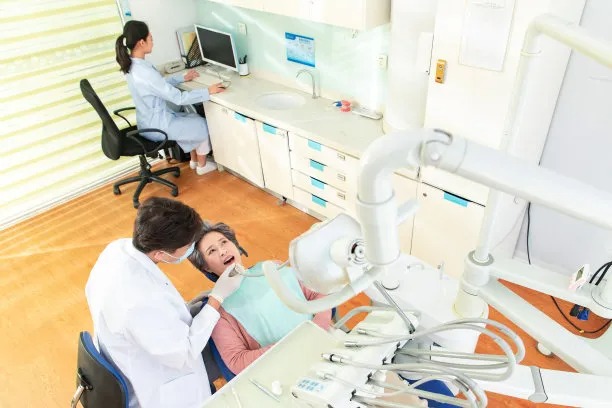Summary: Dental fillings are essential for restoring damaged teeth, but proper precautions must be taken before and after the procedure to ensure optimal oral health. This article explores key guidelines that can help patients prepare for dental fillings and promote a smooth recovery. It emphasizes the importance of choosing the right dental professional, understanding the materials used, practicing good oral hygiene, and following post-treatment care instructions. Each step is designed to enhance patient comfort, minimize risks, and improve long-term dental health.
1. Choosing the Right Dentist for Your Fillings

When considering dental fillings, selecting the right dentist is a crucial first step. It is essential to research and find a qualified dental professional who has experience in administering fillings. Look for reviews, ask for referrals from friends or family, and check their credentials. A skilled dentist will not only ensure that the procedure is done correctly, but also help you feel more comfortable during the process.
Moreover, scheduling a consultation prior to the procedure can be incredibly beneficial. During this visit, you can discuss your concerns, the various filling options available, and receive personalized recommendations. Understanding the different materials used in dental fillings, such as amalgam or composite resins, can also help you make informed decisions based on your needs.
Lastly, communication with your dentist is vital. Ensure you ask any questions you may have and clarify any uncertainties before the day of your filling. Pre-appointment communication sets the stage for a smooth and successful treatment experience.
2. Preparing for the Filling Appointment
Preparation is key to a successful dental filling procedure. Before your appointment, ensure you have a clear schedule that allows for rest and recovery afterward. Depending on the type of filling you are receiving, some procedures may require more time for the anesthesia to wear off, so plan accordingly.
Additionally, you can prepare your body by staying hydrated and fasting if advised by your dentist. Being well-nourished can help your body recover post-procedure. If prescribed, take any medications as directed, especially if you have anxiety or allergies that may impact the treatment.
Finally, its a good idea to arrange for someone to drive you home after the appointment. The effects of dental sedation can linger, making it unsafe to drive immediately afterward. Having a support system in place alleviates stress, allowing you to focus on your recovery.
3. Maintaining Good Oral Hygiene After Fillings
Post-treatment oral hygiene is equally important for ensuring the longevity of dental fillings. After the procedure, it is advisable to wait a few hours before eating or drinking anything hot to prevent sensitivity. Pay attention to any discomfort and use over-the-counter pain relief as recommended.
Once you resume regular activities, be sure to practice diligent oral hygiene. Brushing your teeth at least twice a day with fluoride toothpaste and flossing daily helps to protect the filling and the surrounding tooth structure from decay. Special attention should be paid around the filling area to remove any food particles and plaque buildup.
Regular dental check-ups play a significant role in maintaining oral health as well. Schedule follow-ups with your dentist to monitor the filling’s condition and address any emerging issues. Consistent professional cleanings and assessments help identify potential problems early, saving you from more extensive procedures later on.
4. Recognizing and Addressing Complications
After getting dental fillings, it is essential to know how to recognize potential complications. Common post-filling issues include prolonged sensitivity to hot or cold, pain while chewing, or visible signs of wear. If you experience any persistent discomfort beyond a few days, it is crucial to promptly contact your dentist for evaluation.
An additional concern is the filling material itself. Sometimes, fillings can become loose, leading to gaps that may cause food to get trapped, increasing the risk of cavities. If you notice this issue, seek professional help immediately to prevent further damage to the tooth.
Lastly, be aware of any signs of allergic reactions or adverse effects stemming from the materials used. Swelling, redness, or rashes are signals that should not be ignored. Keep your dentist informed for proper management of any complications you may encounter.
Summary:
Overall, taking the right precautions before and after getting dental fillings is fundamental in ensuring successful treatment and optimal oral health. By choosing a skilled dentist, preparing appropriately, maintaining good hygiene, and monitoring for complications, patients can sustain healthy teeth and a confident smile. These actions not only minimize risks but also contribute to lasting dental health.
This article is compiled by Vickong Dental and the content is for reference only
Vickong Dental
Vickong Dental is a large medical group established in Hong Kong in 2008 by professors from well-known medical universities in Guangdong and Hong Kong, as well as medical doctors from key national '985' universities (including Master's supervisors and senior professors). The chain of branches brings together expert dentists with PhDs and Master's degrees from Hong Kong and Mainland China, committed to providing high-quality dental treatment.
"Vickong Dental Practices the University Motto of 'Healing and Serving Society,' with a Stable Operation for Sixteen Years. It Has Been honored with Hong Kong Enterprise Leaders's Choice,' and is a Global Trusted Implant Center for the Nobel Implant System. Recommended by Hong Kong Metro Broadcast and Guangdong Television, it Serves Customers from Over Thirty Countries and Regions, Gaining the Trust and Favor of Citizens from the Guangdong-Hong Kong-Macau Greater Bay Area and Surrounding Cities.

Thousands of customers' unanimous praise
The most recognized and highly recommended dental service by customers in the Guangdong-Hong Kong-Macau Greater Bay Area
We Ensure You Receive Detailed Care and Attention Here
Hong Kong standards, Shenzhen prices, Your Trusted English-speaking dentists

Vickong Dental Medical-Grade Instrument Disinfection Process
Vickong Dental Medical-Grade Instrument Disinfection Process

Vickong Dental Chain: A Warm and Comfortable Environment for Treatment






Appointment Hours

Q&A
Why choose Vickong Dental?
Vickong Dental practices the university motto 「Medicine to Benefit Society」, with each branch bringing together highly qualified dentists with doctoral and master’s degrees from Hong Kong and the Mainland, and has maintained seventeen years of steady operation。Recipient of 「2024 Hong Kong Enterprise Leaders Brand」, 「2025 Hong Kong Enterprise Leaders Brand」, a Nobel Biocare Global Trusted Implant Center, and a brand recommended by Metro Radio Hong Kong and Guangdong TV。
To date, we have served customers from more than thirty countries and regions,earning exceptionally high word-of-mouth recognition and trusted recommendations from residents across the Guangdong-Hong Kong-Macao Greater Bay Area and surrounding cities
We have eight major branches in Zhuhai、Shenzhen,and a consultation and service assurance center in Hong Kong,so you can book a free consultation at any time for any questions,which is very reassuring.
If I do not accept the quotation after the CT scan, will I be charged??
No! As long as the actual treatment has not started, you will not be charged any fees.
Will there be any additional charges during the treatment process?
No, there won’t be any additional charges. Before treatment begins, we will clearly explain the treatment plan and its corresponding fees. Only after the patient agrees and signs the consent form will we proceed with the dental service.
Can I pay in Hong Kong dollars?
Yes. Vickong Dental accepts payment in Hong Kong dollars. The amount will be converted based on the exchange rate of the day, and the applicable rate will be clearly communicated to you in advance.
Can I reschedule my appointment at any time?
Yes. Please contact us via **WeChat** or **WhatsApp** as early as possible, providing your original appointment time and details, along with your preferred new date and time slot for rescheduling.













